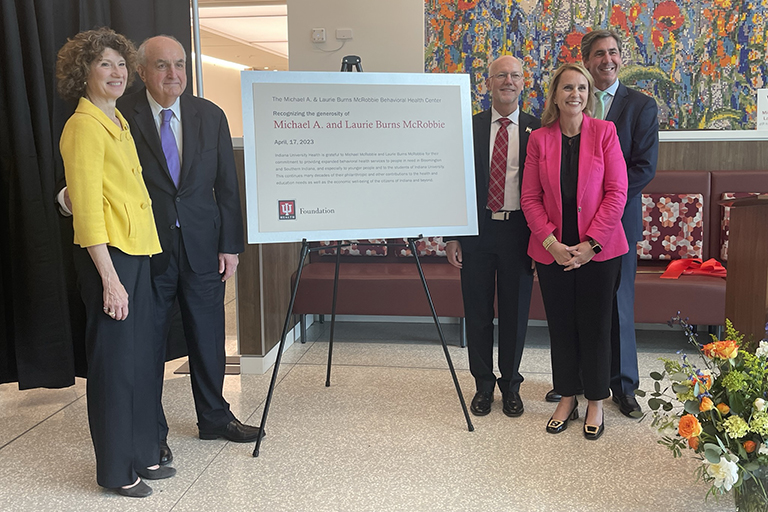Thanks very much, Dennis. And my most grateful thanks to both you and Brian for your partnership during the highly productive years we worked together.
A deterioration in the mental health of Americans, especially young Americans, has been developing slowly and insidiously for many years now. Its causes are complex, but it has been exacerbated for many decades by a lack of investment in behavioral health services and care. This area has also lagged behind in philanthropic investments as it is seen as being less “glamorous” than other areas such as cancer and cardiac research and care, which have seen a constant stream of multi-million-dollar gifts around the nation over many years. And there is no doubt that this deterioration was sharply and dramatically accelerated by the COVID-19 pandemic.
Today the word “crisis” is used ubiquitously to describe this situation but is no longer an exaggeration. The former CEO of IU Health, Dan Evans, and the former chairman and CEO of Eli Lilly, John Lechleiter, in a recent IBJ op-ed drew attention to this crisis right here in Indiana and called for urgent action. The Washington Post editorial board earlier this month noted this is a national crisis and can no longer be swept under the table.
Few families in this country are unaffected by this crisis. Many state governments are finally starting to act, sometimes in rare shows of bipartisan unity. The stigmas in this area are finally lifting due to the work of organizations such as “U Bring Change 2 Mind” in which Bernice Pescosolido, who we are delighted is with us today, has played such a leading role. And health systems have been increasing their investments in this area in response to this crisis.
And now it is time for private philanthropy to invest in behavioral health on the same scale as they have in other more “traditional” areas and for it to play its part in addressing this crisis.
Our gift to IU Health is to support behavioral health services here at the IU Regional Academic Health Center (RAHC), which we are delighted IU Health will match.
Our gift is focused particularly on expanding and enhancing peer counseling and other mental health services for 18- to 34-year-old behavioral health patients—a demographic where there is major need, especially among undergraduate and graduate college students. Members of this demographic, especially those who are students, are particularly vulnerable to depression, substance use disorder, eating disorders, achievement anxiety, difficult workplace environments, and the impact and trauma resulting from racial, gender-based, and other violence. In 2022, around 10,000 patients at the RAHC were seen for behavioral health issues, 30% of them ages 18 to 34.
During the 14 years I served as president of IU, IU made the physical and mental well-being of students a top priority, adopting strong policies and practices to bolster student success. During the COVID pandemic, the behavioral health of the IU community was a major concern as part of our heavily science-based response to it. IU’s student body itself has established many meritorious student-generated initiatives. IU students can access mental health services at the IU Bloomington Student Health Center and other programs at IU, and I am glad to see this commitment continuing and expanding. But when people are in crisis at IU, in Bloomington, or in south central Indiana, acute and emergency care services for them are provided right here in the RAHC.
IU has also invested heavily in research in this area through the university-wide multi-disciplinary “Responding to the Addictions Crisis” Grand Challenge project. This was made possible by $24 million of new funding, as well the engagement of hundreds of faculty, students, and staff, and involved extensive collaboration and cooperation with IU Health, and state and local governments. And we are very pleased that the driving force behind IU’s whole highly regarded grand challenge program, and who deserves great credit for it, VP for Research Fred Cate, is here today.
One of the achievements during my years as IU president of which I am most proud is the decision IU and IU Health announced in 2015 to establish this magnificent facility on the IU Bloomington campus. Today it co-locates this superb new hospital with IU Bloomington's Health Sciences Building, which consolidates IU's education programs in medicine, nursing, social work, and speech, language, and hearing sciences in one place, hence forming an academic health center second only in scope and scale to that in Indianapolis. And we are also very pleased that Dan Evans, the former CEO of IU Health, is here, who was decisive in the decision to establish the RAHC on this site in partnership with IU.
One of the many great benefits of constructing this new hospital is that it provided a matchless opportunity to build new and expanded modern state-of-the-art behavioral health facilities. Hence the establishment of the RAHC on the IU campus. These new facilities, and the rapidly emerging behavioral health crisis, presented an opportunity for Laurie and me, after discussion with our family, to make a gift particularly focused on expanding and enhancing peer counseling and other mental health services for a demographic that includes many college students as a contribution to addressing this crisis.
Laurie will now say a little more about this.


